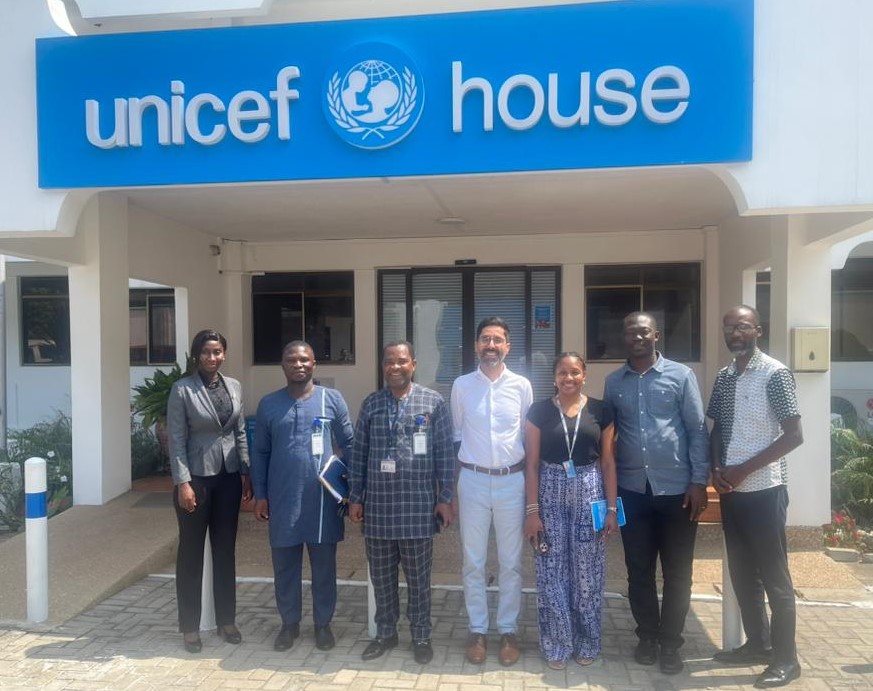College of Health Sciences and UNICEF to Enhance Research Partnership
On a recent visit by the Provost of the College of Health Sciences, Prof. Alfred Edwin Yawson to UNICEF, both institutions engaged in discussions aimed at strengthening their existing partnership.
The meeting, which took place at UNICEF's Ghana office, provided an opportunity for Prof. Yawson to share his vision for the College and elaborated on activities and areas for potential collaboration with UNICEF Ghana. These include medical training, capacity building in Health, research collaborations, strengthening health systems, providing support for children with special needs and safeguarding the environment.
Mr. Juan Emmanuel Dewez, the Chief of Health and Nutrition, UNICEF, was delighted about the College’s expertise and capabilities and easily identified with the University’s research and capacity-building initiatives that align with their mission to enhance growth and development, with a strong focus on child protection, adolescent trauma and maternal health.
One of the key areas discussed during the meeting was health education. Mr. Dewez emphasised the importance of enhancing the capacity of health professionals, particularly community health nurses, to promote quality teaching and preventive care. He expressed keen interest in engaging the esteemed faculty of the College of Health Sciences to review existing policies and curricula, collaborate on research and conduct cost-benefit analyses of ongoing programmes. The aim of the collaboration is to ensure that health education remains relevant and impactful, particularly in underserved communities in Ghana.
On technology, Mr. Dewez asserted that UNICEF is at the forefront of piloting point-of-care testing for the early diagnosis and detection of diseases. Recognizing the expertise within the College of Health Sciences, he challenged the faculty to undertake research to identify alternative solutions and devices to replace cartridges to minimize shortages. This partnership could pave the way for innovative approaches to healthcare delivery, particularly in resource-constrained settings.
Mr. Emmanuel Kyeremateng-Amoa, Health Specialist in Environmental Health and Climate Change, UNICEF, expressed his displeasure with the impact of illegal mining on the Health of babies, children and mothers. He sought the College’s assistance in conducting evidence-based research on the impact of illegal mining on children's health, particularly during prenatal, postnatal, and early childhood development, resulting from exposures to heavy metals such as lead and mercury. He requested further research on possible devices to filter polluted air, especially in Accra, where industrial activities contribute to poor air quality. He indicated that research could lead to practical solutions that can mitigate the environmental health risks faced by vulnerable populations, particularly children.
The discussion also touched on the pressing issue of climate change and its effects on health. Mr. Paul Henry Dsane-Aidoo, Health Specialist on HIV, Adolescent Health and Gender, UNICEF, recommended intensive research on how climate change impacts maternal health and the occupational exposures faced by mothers. He mentioned that research could inform future policies and interventions aimed at protecting vulnerable populations from the adverse effects of climate change.
In exploring food systems and preventing malnutrition, Mr. Juan Emmanuel Dewez expressed interest in carrying out a study to better understand food systems in Ghana. The study, according to him, should focus on preventing malnutrition, with a particular emphasis on maternal nutrition. The College of Health Sciences was seen as a valuable partner in this endeavor, bringing its expertise in public health and nutrition to the table to enhance collaboration and drive impactful results.
Mr. Juan Emmanuel Dewez also highlighted an ongoing initiative of UNICEF aimed at protecting adolescents who must cross rivers to reach their schools, farmland, etc. It was noted that a pilot study providing boat owners with life jackets was underway, with plans to expand this initiative by offering training in swimming and other safety techniques. To support this effort, they requested the assistance of Prof. Yawson and faculty of the College, to conduct a survey to gather baseline data, which would help in developing strategies to prevent trauma and accidents among adolescents.
The meeting between Prof. Yawson and the delegation at UNICEF concluded on a positive note, with both parties discussing potential funding opportunities in key areas where the College of Health Sciences could support UNICEF’s mission. The Provost expressed his enthusiasm for the proposed collaborations, recognising the mutual benefits of combining the College’s academic and research strengths with UNICEF’s on-the-ground experience and resources.
The courtesy visit has set the stage for a deeper and more strategic partnership between the College of Health Sciences and UNICEF with shared goals of improving health outcomes, protecting vulnerable populations, and advancing knowledge through research, both institutions are poised to make significant contributions to Ghana's health sector. As these collaborative efforts unfold, they promise to bring about meaningful change, particularly in the areas of child protection, adolescent health and maternal care.
